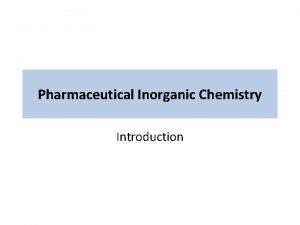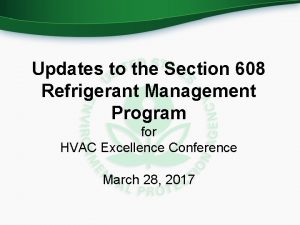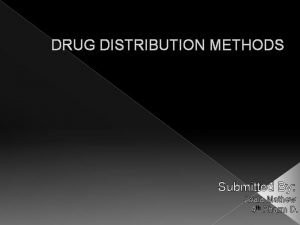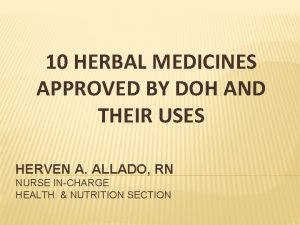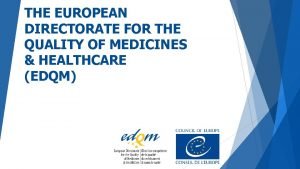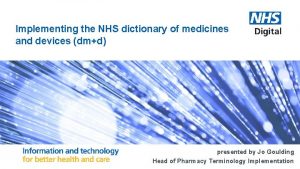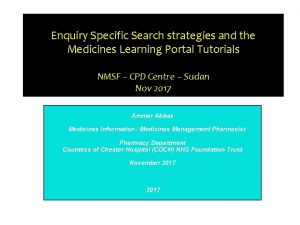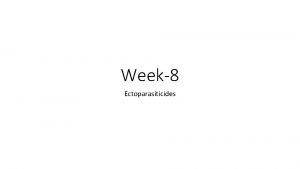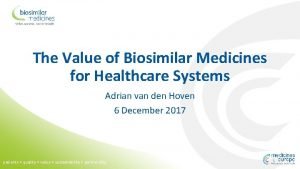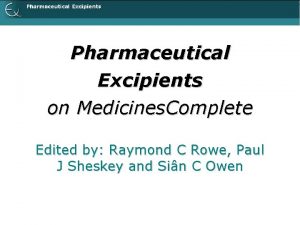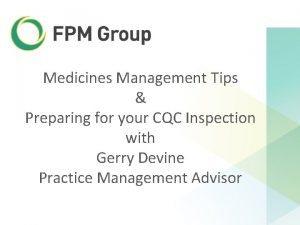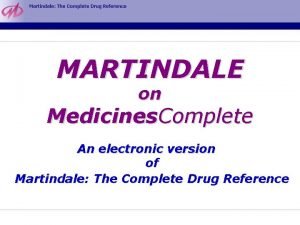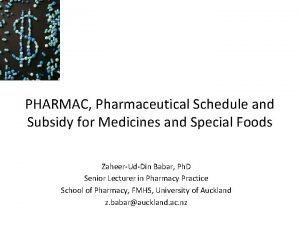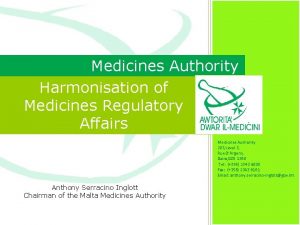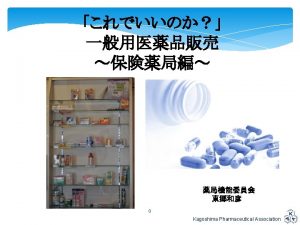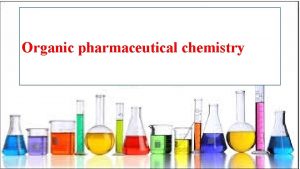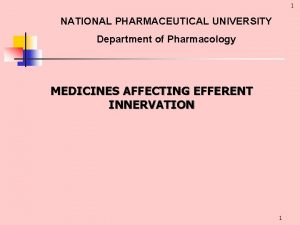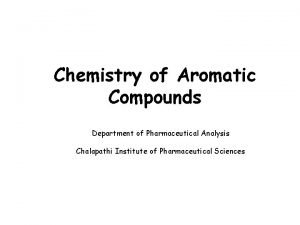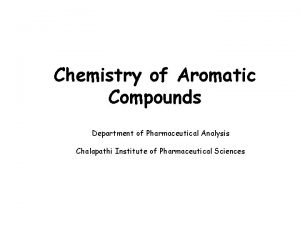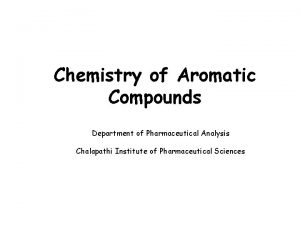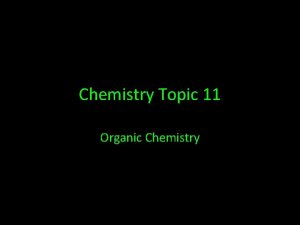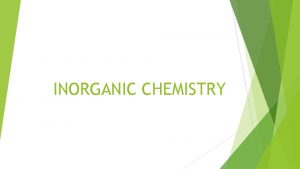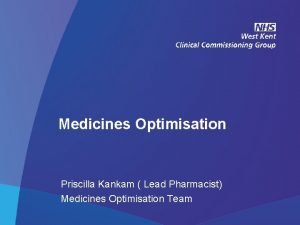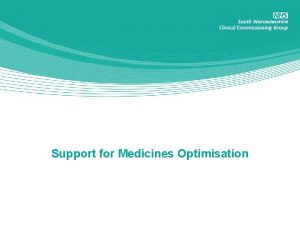PHARMACEUTICAL ANALYSIS OF MEDICINES Department of Pharmaceutical Chemistry

















- Slides: 17

PHARMACEUTICAL ANALYSIS OF MEDICINES Department of Pharmaceutical Chemistry https: //www. vnmu. edu. ua/Department of Pharmaceutical Chemistry

There are special requirements for the quality of medicines, as they are designed to guarantee the effectiveness and safety of the drug, and therefore the health of each person and society as a whole. Pharmaceutical analysis is an important component of drug quality assurance. It is a set of methods that allow to assess the quality parameters of chemical substances at all stages of the existence of medicine.

In the structure of pharmaceutical education, one of the leading positions is occupied by pharmaceutical chemistry. Pharmaceutical analysis of medicines as an integral part of pharmaceutical chemistry includes the study of issues on the quality assurance system of medicines, the organization of quality control of medicines in the pharmacy, the organization of work of pharmacist-analyst of the pharmacy, comprehensive assessment of quality of medicines and more. This is necessary in the practice of pharmaceutical professionals.

▶ Types of educational classes according to the curriculum are lectures, practical classes, independent work of students. ▶ The topics of the lecture course reveal the problematic issues of the relevant sections of pharmaceutical analysis. ▶ Practical classes according to the method of their organization are seminar or laboratory, because they provide: - discussion of the main issues of the topic; - performance of laboratory practicum (in case of impossibility of performance of laboratory work - consideration of situational tasks on the topic of the class, - solving calculation problems, working with quality control methods and elaboration of other normative documents); - choice and justification of a method, course of analysis of a substance or dosage form; - conducting the necessary calculations to assess the quality (including quantitative analysis) of research objects; - formation a conclusion about the compliance of research objects with the requirements of the methods of quality control (at quality control on separate indexes).

▶ Assimilation of the topic is controlled in practical classes in accordance with specific goals, assimilation of material - in practical final classes. The following tools are used to diagnose the level of preparation of students: multiple choice questions (MCQ), performance of situational tasks for self-preparation for classes, filling out of workbooks, interpretation of laboratory tests of analysis, interpretation and evaluation of their results, analysis and evaluation of research results and parameters characterizing the quality of medicine; control of practical skills. The final control of assimilation of material of the section is carried out after its completion. Assessment of student performance in the discipline is a rating and is set on a multi-point scale and is determined by the ECTS system and the scale adopted in Ukraine.

In 2017 with the assistance of the university administration in the Department of Pharmaceutical Chemistry, an educational and scientific laboratory of chemical and pharmacognostic research was created During the practical classes students have the opportunity to get acquainted with the organization of work in the laboratory, as well as to conduct analytical research.

The laboratory is equipped with modern instruments: Spectrophotometer Agilent Cary 60; ▶ Rotary evaporator RV 8 c; ▶ Binocular microscope Leika DM 750; ▶ ABBE laboratory refractometer AR 4; ▶ Aquadistillator electric ДЕ-10 М; ▶ Analytical scales VIBRA series HTR-220 CE; ▶ Drying wardrobe; ▶ Muffle furnace; ▶ Colorimeter photoelectric КФК-2. ▶

Research methods offered by the laboratory: - spectrophotometric studies (spectral range 190 -1100 nm); - photoelectrocolorimetry;

- refractometry; - determination the loss in weight on drying; - dry ashing;

- extraction of biologically active substances (BAS) from medicinal plant raw materials followed by removal of the extractant under vacuum; - microscopic analysis.

Prerequisites of the discipline Basic knowledge and learning outcomes are based on the study of the chemical structure of drugs, their physical and chemical properties; the relationship between chemical structure and action on the organism, methods of quality control and changes during storage. Interdisciplinary communications: general and inorganic chemistry, organic and bioorganic chemistry, analytical chemistry, biophysics, biology, physical and colloidal chemistry, pharmaceutical chemistry, pharmacology, toxicological chemistry, pharmacognosy, technology of medicines, clinical pharmacy. Postrequisites of the discipline Knowledge, skills and abilities acquired after the completion of the study of pharmaceutical analysis of medicines are necessary for the correspondence and full-time cycles of internship in the specialty "Pharmacy", as well as successful and highly professional pharmaceutical activities.

The aim of education in the discipline pharmaceutical analysis of medicines: to fix of theoretical knowledge, practical skills and abilities obtained in the educational process for solving specific tasks of practical activities of pharmacist-analyst in a pharmacy, control and analytical laboratories of the State Service of Ukraine for Medicines and Drug Control, development, consolidation and deepening of practical skills in pharmaceutical chemistry, standardization and quality control of medicines.

Learning objectives in the discipline pharmaceutical analysis medicines: study of the duties of a pharmacist-analyst in the workplace; acquaintance with organization and technical equipment of the workplace of pharmacist-analyst; quality control of medicines and preparation of relevant documentation.

The content of the discipline pharmaceutical analysis of medicines: 1. History of creation of modern system of quality control of medicines in Ukraine. 2. Organization of quality control of medicines in a pharmacy. Organization of work of the pharmacy-analyst. 3. Quality control of purified water and water for injections. 4. Quality control of in-pharmacy preparations and concentrates. 5. Quality control of ophthalmic dosage forms manufactured in a pharmacy. 6. Quality control of parenteral dosage forms manufactured in a pharmacy. 7. Quality control of extemporaneous dosage forms manufactured in a pharmacy. 8. Organization and conditions of storage of medicines and medical devices in a pharmacy. 9. Organization of incoming quality control of medicines in a pharmacy. The role and tasks of the authorized person to ensure the quality of medicines. 10. Registration of medicines. Licensing of medicines in the EU. 11. Certification of pharmaceutical products and quality systems in Ukraine. 12. Validation of analytical methods of analysis of medicines.

During the study of the discipline students have the opportunity to visit pharmaceutical companies in Vinnytsya: - PJSC "Infusiа «

- joint Ukrainian-Spanish enterprise Ltd. «Sperko Ukraine» At these enterprises students get acquainted with modern methods of pharmaceutical analysis in practical conditions

IF YOU WANT TO GET THE BEST PRACTICAL KNOWLEDGE OF YOUR FUTURE PROFESSIONAL ACTIVITY, WE INVITE YOU TO THE DEPARTMENT OF PHARMACEUTICAL CHEMISTRY
 Inorganic pharmacy
Inorganic pharmacy Veterinary medicines directorate
Veterinary medicines directorate Chapter 19 medicines and drugs vocabulary practice answers
Chapter 19 medicines and drugs vocabulary practice answers George's marvellous medicine story
George's marvellous medicine story Refrigerant management program
Refrigerant management program Advantages of the unit dose drug distribution include
Advantages of the unit dose drug distribution include Tsaang gubat uses and benefits
Tsaang gubat uses and benefits European directorate for the quality of medicines
European directorate for the quality of medicines What legislation helped solve dangerous food and medicines
What legislation helped solve dangerous food and medicines Nhs dictionary of medicines and devices
Nhs dictionary of medicines and devices Medicines learning portal
Medicines learning portal Ectoparasiticides veterinary medicines
Ectoparasiticides veterinary medicines Abasagar
Abasagar Medicines complete
Medicines complete Cqc medicines management
Cqc medicines management Medicines information centre
Medicines information centre Medicinescomplete martindale
Medicinescomplete martindale Pharmac pharmaceutical schedule
Pharmac pharmaceutical schedule
